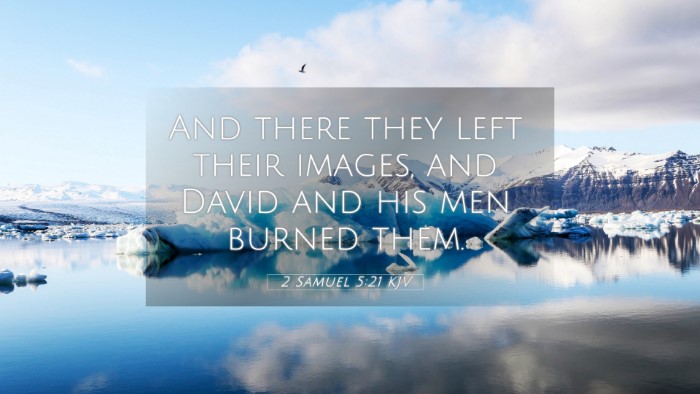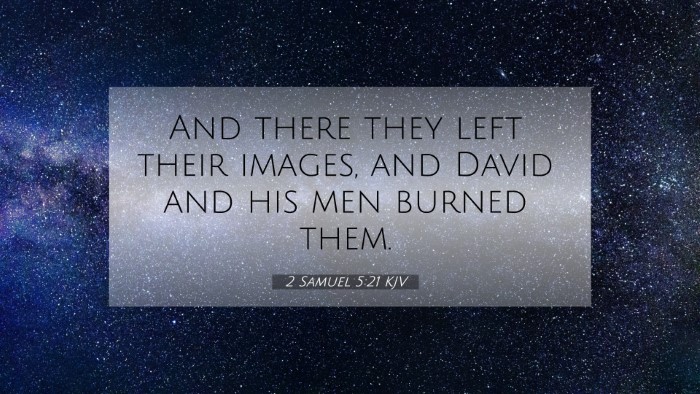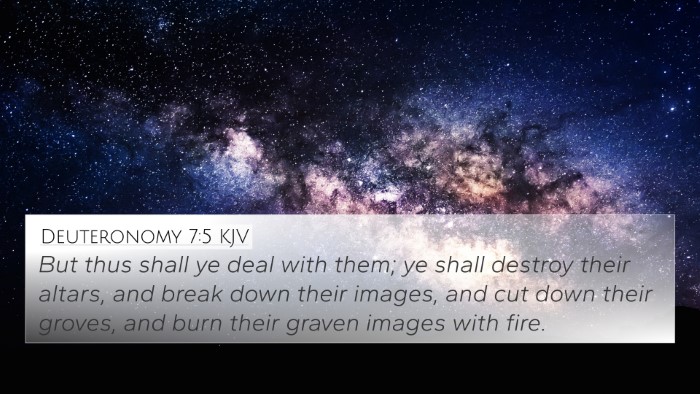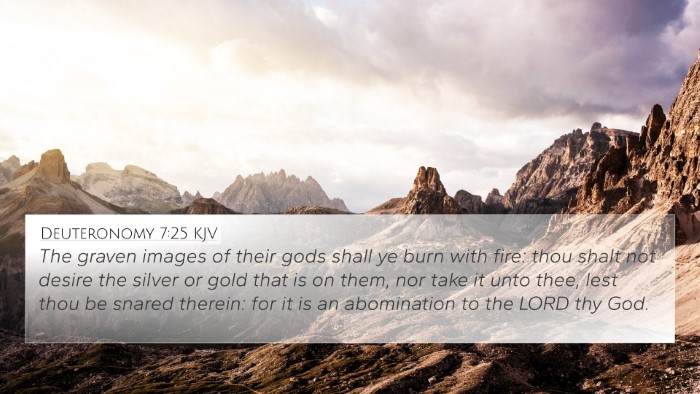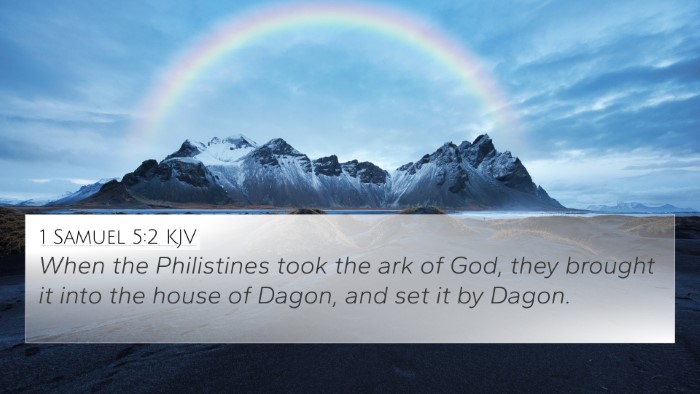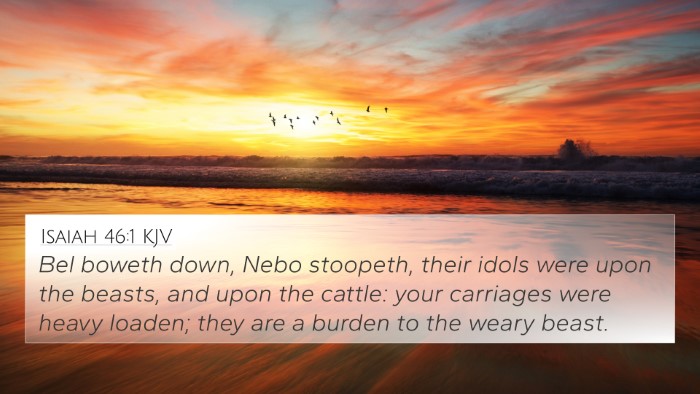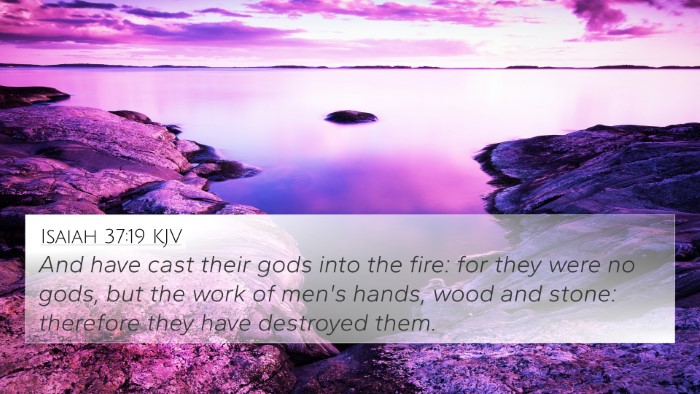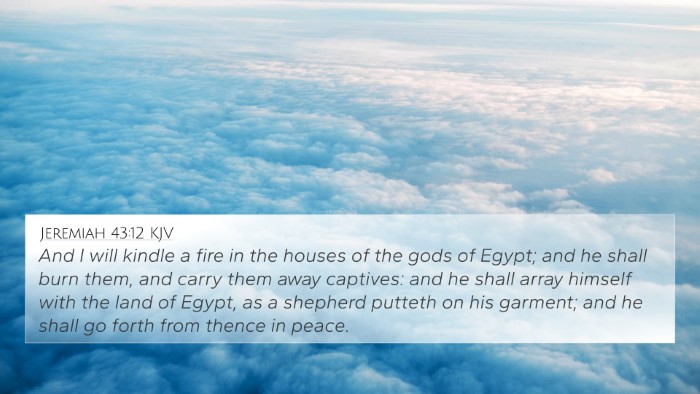Bible Verse Meaning: 2 Samuel 5:21
Verse: "And they left their idols there: and David and his men burned them."
Summary and Interpretation
The verse conveys a significant moment in the narrative of King David's rise to power and the rejection of idol worship. The Philistines had faced David in battle, and upon their defeat, they abandoned their idols. David's act of burning these idols symbolizes the rejection of false gods and the commitment to the worship of the one true God.
Insights from Public Domain Commentaries
- Matthew Henry: Henry emphasizes the importance of rejecting idols among the covenant people of God. He notes that the burning of the idols reflects a thorough and decisive rejection of idolatry as David establishes his reign. This act validates David's loyalty to God and marks a crucial step in purifying the nation from false worship.
- Albert Barnes: Barnes highlights that the Philistines’ defeat and abandonment of idols is a recognition of God’s power. He draws parallels between this event and the greater spiritual battles faced by the Israelites, reinforcing that abandoning false gods leads to divine favor. Barnes suggests that this moment leads to an era of devotion among the people under David’s leadership.
- Adam Clarke: Clarke notes that the act of burning the idols signifies a complete rejection of pagan practices. He interprets this verse as a foreshadowing of David’s role in uniting Israel under God—a theme prevalent throughout his kingship. Clarke also ties this back to the importance of leaders setting an example in the spiritual realm.
Connections Between Bible Verses
This verse can be understood more deeply by examining several related scriptures. Here are some notable cross-references:
- 1 Samuel 7:3: "And Samuel spake unto all the house of Israel, saying, If ye do return unto the LORD with all your hearts, then put away the strange gods and Ashtaroth from among you, and prepare your hearts unto the LORD, and serve him only..." - This emphasizes the call to remove idols in worshiping God.
- 2 Kings 18:4: "He removed the high places, and brake the images, and cut down the groves..." - A parallel in which reformative actions against idolatry are taken.
- Exodus 20:3-4: "Thou shalt have no other gods before me. Thou shalt not make unto thee any graven image..." - Establishing God’s command against idolatry that resonates throughout Scripture.
- Isaiah 44:19: "And none considereth in his heart, neither is there knowledge nor understanding to say, I have burned part of it in the fire; yea, also I have baked bread upon the coals thereof; I have roasted flesh, and eaten it..." - A reflection on the folly of idol worship.
- Jeremiah 10:14: "Every man is brutish in his knowledge: every founder is confounded by the graven image: for his molten image is falsehood..." - A denunciation of the folly in idol-making.
- Hosea 14:8: "Ephraim shall say, What have I to do any more with idols?" - A concluding statement against idol worship in Israel.
- Acts 19:19: "Many of them also which used curious arts brought their books together, and burned them before all men..." - Echoes the theme of purging idolatrous practices in early Christianity.
Thematic Bible Verse Connections
The theme of rejecting idols resonates throughout both the Old and New Testaments. The burning of the Philistine idols by David mirrors the call for purity and devotion found in various passages, establishing strong thematic connections including:
- Decisive actions against idolatry: This theme is pivotal, as seen in other kings’ reforms (e.g., Josiah in 2 Kings 22-23).
- God's sovereignty over false gods: God’s supremacy is repeatedly affirmed throughout Scripture, particularly in narratives of defeat over idol-worshiping nations.
- Spiritual renewal: The act of burning idols reflects a broader theme of spiritual awakening and recommitment to God seen in various revival moments throughout Biblical history.
Conclusion
2 Samuel 5:21 illustrates the critical moment of choosing fidelity to God over the enticements of idolatry, a theme reiterated through various passages across both Testaments. The burning of the idols not only marks a pivotal point in David's reign but also reinforces a foundational principle of faithfulness to God. Those engaging in a study of this verse will find a wealth of connections through cross-referencing, allowing for a richer understanding of the Biblical text and its application.

